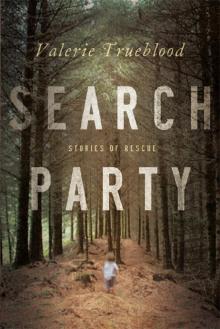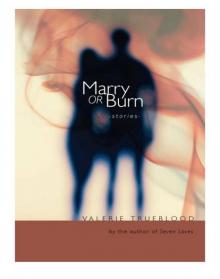- Home
- Valerie Trueblood
Marry or Burn Page 3
Marry or Burn Read online
Page 3
On the bed sat a woman who, if she was Sharla, had had the innards sucked out of her and a formation of dry black hair set on her like a drink umbrella. On the other bed lay the fat woman from the other picture, fast asleep on top of the covers.
“Get me out.”
The aide was gone. Francie wasn’t worried; she could help somebody out of bed. She knew how from times with her mother, getting her up off the couch or the floor. This woman didn’t weigh anything. Nevertheless it took effort to get her into the wheelchair by the bed, checking the brake first so it wouldn’t slide out from under them. Her mother had had this happen, and this had lost her the job of transporter at the hospital.
“Sharla,” Francie said, kneeling beside her. “It’s Francie.” She spoke softly so as not to wake the other woman.
With chewing motions, the woman adjusted her cracked, shiny mouth. She rolled her tongue several times as if she had a hair in her mouth. “Juice.” She had a tube of lip balm in her hand, which she pointed with. Francie could just make out the words. “That’s juice, I said Coke.”
“I’ll get you some Coke,” Francie said, jumping up. There was a kitchenette at the end of the hall, with paper cups. Were they pill cups? Who would want a drink that small? In the refrigerator, apple juice. She poured it.
“This is only thing I can find out there, apple juice,” she said. “I’m sorry, I’ll ask. I’ll find somebody to ask.” But Sharla reached for the juice, whereupon the thin cup gave and spilled. “Wet, wet!” Sharla slapped at Francie’s hand.
She found Kleenex; she wiped the sleeves of Sharla’s robe. She sat down carefully on the edge of the bed. “I’ve been back a while,” she began. “I’m not sure if you heard that. I’ve been wanting to come. I don’t have a car yet. Forty-one and no license!” She laughed but found she was close to tears. “So, I just took the bus. I’m down by the airport. Oh, Sharla. I’ve been wanting . . .”
Sharla made no reply. She rummaged in her lap for the lip balm. What was she doing? She wanted more tissues; she was pointing at the box, exasperated. She thought Francie worked there. She didn’t know her. She thought she was an aide.
Francie passed her the box. “Well, it’s good, it’s good to see you again.” She would go a little way into what she had planned to say, she decided. Just to have it said, whether Sharla made any sense of it or not. “Because you mean a lot to me.” What kind of a half-assed thing was that to say? Was that what she had been preparing all these weeks? “You always have. Sharla, I know I was . . . you know I—I was . . .”
Sharla was chewing her lips on the inside and staring at a flagpole out the window.
Francie kept still for a while and then she sighed. “Well, I’ll come another time.” She got off the bed. “Is that all right? I will, I’ll come again, if it’s all right.”
What was that sound? Did Sharla sigh too? She had reached out and taken Francie’s wrist. She held it lightly, in fingers from which the plumpness, the flesh itself, was gone. To Francie it was like having her wrist taken in chopsticks. But the hand gently pulled her. Relief flooded Francie and she bent close, to lay her cheek on Sharla’s.
“Killer,” Sharla whispered.
ALL THE WAY home on the bus she had a pain over her eye. Back in the kitchen, with the pain still making her half sick, she talked to Rafael. He said he had friends coming over and he didn’t know why he was the one who always had to make the cake. He meant his girlfriend Tonya was coming, but Francie didn’t argue; she kept it short so he wouldn’t look at her hands shaking.
Twenty people were coming—everybody from the house, the neighbors, Tom’s partners—to process, as Dale put it, through the duplex and bless it. This was Dale’s plan. She got the idea from Georgette, who was newly out of the penitentiary and said she was a Chinook. Dale had candles and feathers, she had a smudge pot, a big bowl of sage leaves to be burnt as Patrick and Georgette performed the blessing.
Dale and Patrick were going to break their rule and give everybody except the ones in AA a glass of champagne, including Rafael. Francie happened to know that alcohol was nothing new to Rafael. He was only fifteen but he was living by himself over the garage, where he had taken care of his mother Paloma after she got too sick for her job at the prison and then too sick to work in the halfway house. “Look in the trash,” Paloma had whispered to Francie. “Beer cans.”
Kids drank beer. Francie knew that; it was Dale and Patrick who didn’t know it. They always said Rafael was Paloma all over again, but lately Francie could see that more than just his mother’s nature had gone to make up his. Until recently, tall as he was, he had been a little boy. In Francie’s brief time there he had gone from a stick-limbed kid she could boss around and buy T-shirts for and even bundle into her lap with his feet dangling to the possessor of a place on the basketball team and a girlfriend two years ahead of him in school. He had grown another three inches. He would roll his eyes if you talked to him. Tom told him where to put the extension ladder and he slammed it down somewhere else. He bounced the ball so hard on the siding it left scuff marks. He screamed at the refs on TV.
Francie had made promises to Paloma: that she would watch over Rafael, be the next best thing to a mother to him. Make sure he graduated. Make sure he kept up his art. Keep an eye on his girlfriend.
Tonya came over every day. Dale and Patrick didn’t know what you could be up to at that age.
As she was getting the cake out of the oven, Dale came in. Francie had been moving fast and there was batter all over the counter and a mess in the sink. She wasn’t crying, but Dale’s glance made her feel as if she had been. “I was just over putting up some streamers for tonight. Oh, it’s amazing what you’ve done, you and Tom,” Dale said. She began to pace the kitchen without picking up any of the mess. She had the look she got when she was going to pray. “Francie, we’ve had some bad news.”
Francie turned away. She didn’t want any of the sadness Dale tried to coax from them. The only thing worse was when she put effort into cheering them up.
“Maxine passed away. We got a call this afternoon, from the infirmary.” Dale never said prison. “She had such bad diabetes, you know. I’m sorry. I know you loved her.”
Loved her? Dale was always telling them they loved this person and that person and each other, as if that would make them do it. Maxine. Francie wiped her eyes.
Dale wiped hers too. “So many changes. You know, Francie, you’ve added so much to our lives here.” Francie got behind the butcher block island Tom had built. Dale came around the island and took up a position in front of her as if she might shake her hand. “And I must say we’ve relied on you. But lately I think—and maybe you think so too—that it might be you don’t need us as much anymore.”
Francie didn’t say, But I do. I need one of you. Not you.
“What I think is that you’re pretty much ready for your own place. You’re not on parole like Rhonda or Georgette. You can do whatever you want. You can get started in your own place. I think before you know it we’ll be blessing your apartment.”
“You mean,” Francie said, pressing her eye to relieve it, “leave your son alone.”
This did not seem to surprise Dale. But nothing surprised her; she was like one of those blocking sleds they had at football practice, that couldn’t be knocked over. “No, dear,” Dale said. “No, I mean find your life.”
“My life. How about if we picture it.” It didn’t matter what she said, Dale was going to hug her. When they finished hugging, she gave Dale a thumbs-up. She didn’t say, I won’t leave, I can’t, not yet, I love him.
IT WASN’T THAT she fell. She simply slid down the steps, six or eight of them. She had climbed the rickety outside stairs to Rafael’s room. When he didn’t answer her knock she yelled that the cake was made and he had said he would ice it.
She heard Tonya’s voice, muffled, asking a question. Then Rafael’s, louder. “Bitch is up in my business, that’s how come.”
Francie’
s sight grayed over and that was when she grabbed the railing, which buckled and came with her. By the time they got to the door she was halfway down. She must have made a racket getting there.
Broken posts rolled down the steps as she tried to think of the word Tom had taught her for them. “Whoa momma,” said Tonya’s voice. “But she’s OK, aren’t ya.” Francie had slid on her back; nothing was hurt except her tailbone. Tonya bent over her. “Not gonna talk.”
“You’d talk, if it was you,” Rafael said to Tonya.
Tonya slapped his arm. “I would, you be running out here to save me like that.”
Rafael squatted down beside Francie. He said, “Would you look at that. Dry rot. How you doing?” Francie could tell by his voice that he was scared and sorry. He closed his hand around her wrist, to show her.
“You took a tumble.” Tonya bent over them, showed the sweat between her breasts. “Well, help her up why doncha?”
Rafael pulled Francie to her feet. “I slipped,” she said, dusting off her hands.
“Better watch that,” he said, in his old way.
“Here.” Tonya got her arm around Francie, up against her ribs, and made a show of bearing her weight and lowering her step by step to the bottom.
Tonya wasn’t pretty, but she didn’t have to be, she had the confidence without it. She did have pretty teeth, which she uncovered in a cold smile at Francie. The advantage was hers. She had Rafael. She knew how to comfort somebody who had a dead mother. She knew how to take him away from everybody else who had a claim on him, and how to make him hers.
THEY HAD FINISHED Patrick’s chili and gone on to Francie’s cake, on which at the last minute Rafael had drawn a house in red icing, with the chimney coming out of the roof sideways.
“You poor thing,” Dale said for the third time. “Those stairs are terrible.”
“Rafael’s going to fix that,” said Tonya, as if she were as much a part of what went on as any of them. They had fanned sage smoke into every closet, Georgette had chanted in her language, they had toasted Melanie because she had finished her thesis.
Melanie. Melanie was the other partner. Tom’s other partner.
Melanie had long black hair twisted up with a comb. Francie guessed her weight at no more than a hundred pounds. She was some kind of Oriental and she was beautiful, wearing overalls because she had come straight from work at the condo and a tank top that showed the perfection of her slimness.
Chip sat with Tom on the floor putting CDs into the player. “I was going to bring Tupac,” Chip told him. “You may not know this because you’re not a fan. Tupac died. He died yesterday. It looked like he was going to make it after they shot him, but he died.” At the word shot, Tom shook his head warningly. “Don’t worry, man, I didn’t,” Chip said. “I didn’t bring it.”
Francie wasn’t listening when Patrick started to speak. She was looking at Tom, thinking about his concern for her, and about music, how she couldn’t get used to music as it was now. When Patrick said, “And now for the final toast, the big one. Are we ready?” a hush fell. He was holding the bottle high. “To Tom and Melanie!”
Everybody cheered. The two of them, Tom and Melanie, came forward from opposite sides of the room. They met under Dale’s streamers; they took each other’s hands. “Tom and Melanie!” The noise made everything seem to be proceeding slowly. Patrick took their joined hands and raised them high, as if they were at the Olympics.
Uganda. They were going to Uganda. They had come up with an idea for modular dwellings that could go up fast and hold more than one family. They had done this together. Once they had the design everything had fallen into place in a matter of days. “Oh, it is a disaster there,” Melanie said sorrowfully. They had their sponsor and they were going to build the first models in a refugee camp. They had their passports and they were leaving in a week.
Before that, in five days and in this very room, they were getting married.
That was better than waiting until they got back. Tom said, “We’ll be back in a month. We’ll be back before Chip can sell off the tools.” Everybody cheered again. Francie sat still, on the cleaned-off bench where she and Tom had kept rulers and levels and stashed their books.
“So, a week from today,” Tom said. “And meanwhile, all she has to do is defend her thesis.”
Into the clapping Francie said, “What’s it on? Your thesis.”
“Oh, it is on buildings,” said Melanie. People had quieted down and she turned to Tom in embarrassment, lowering her smooth lids. “Actually, on buildings in . . . in literature. Because, my program is comparative literature.”
“Buildings in literature,” said Francie stubbornly. “What literature?”
“A French novelist,” Melanie said, looking up with a soft smile, as if Francie might be a friend to her. “And an Egyptian and an Israeli. And”—she hurried on—“Crime and Punishment. Because you know, those rooms, they are so important. And of course Kafka.”
“Of course,” said Francie. She knew who Kafka was. She had picked up The Castle from the bench. “Would I like this?” She always asked Tom that.
“You might.”
“But it’s not my kind of book, right? It’s not Pet Sematary.” She brought books with her and put them down and Tom looked at her books too.
“It’s a painful book to read.”
“Oh, dear, no, I don’t go in for that kind of material. Pain.”
He laughed. He always joined in if she was in a good mood, stayed quiet on a day when she was down, always.
“Melanie was our woodworking teacher,” Tom said. He was explaining to Francie and no one else. “Chip and me.”
“Your teacher, no kidding. Is she older than you?”
“I am twenty-five,” said Melanie, with a sad smile. “I am older than he is.”
Tom, who never bragged, said, “The students thought she was fifteen.” She looked fifteen.
“So . . . how many years have you been doing this stuff?”
“In Korea, I started when I was a child, with my father. Like Tom. My father was a builder of shrines.”
“Korea. Did you have a name in your language?”
“I have the name Young. But it does not mean young.” Melanie laughed, a laugh of such sweet apologetic lightness that it dug a splinter into Francie.
When no guesses came to her, even mean ones, Francie said, like a lawyer pressing forward, “What does it mean?”
“Oh, you will laugh, it means eternal,” said Melanie.
“Why would I laugh?”
“I’ve told Melanie about your sense of humor,” Tom said.
“Yeah,” Francie said. “If something’s funny.” She heard the mean sound in her voice.
“Are you doing all right?” Dale asked, sitting close to her on the bench.
“I’m fine.” She was near the wall, the drywall she and Tom had just finished sanding. Let the others mill around admiring the work of months, the pine sills, the flush baseboards.
Patrick was clearing away the chili bowls. Dale patted Francie’s leg and got up to join the circle the women were forming around Tom and Melanie so Georgette could bless them too. They had lit more sage and the smell bloomed up again in the room, like the pulse off the table saw when the wood fell in two.
After a while Francie got up dizzily. Chip was still on the floor, sorting through his CDs. He hadn’t crowded in like the others to hug Tom and Melanie. Maybe he had wanted Melanie for himself. Or maybe he knew something about her. Something he couldn’t warn Tom about because they were all friends. He worked with Melanie every day. You knew everything about a person you worked with. Almost everything.
“I’m sorry about Tupac,” she said to him.
“Yeah.” He looked up at her like a kid. “Why did they do it?”
What a shock to Tupac. How much did you see, in that second? How much did you know? Did you know your life was over? Did you know in that second that others were going to go on just as they were, but you
were dead? “I’m sorry,” she said again. She thought of the day she had killed Gary. After he hurt her. Was it that? Was that all? And then, yes. She got the gun. She shot him. Shot him in the neck. With that neck, his coach used to say, Gary could drag a truck. He would pick Francie up and carry her out of the room. That was when she weighed a hundred pounds herself. They were going to get married in a few years. Nobody warned them not to. A suds of blood and something else pumped out of his neck. And then what? Nothing, after that. For him nothing. For her, this. This life. If she closed her eyes she might see what was going to let her live it.
Suitors
MOODY FARMER
TALL STREET PERSON
BORDERLINE BUSBOY
THESE WERE NOT the captions under the three faces chosen for our daughter by Lali of DataMate. They were our captions.
The first: a blurred picture taken from some distance away of a tall blond man standing in front of a tractor:“Love of country!” Mark loves country life. He enjoys his 4X4 and his fly rod but wouldn’t miss a Valentine’s Day dinner, and he’d prepare it from A to Z, down to the hand-crafted candles! Mark favors long walks and quiet evenings watching spectacular sunsets from the porch (his own) nestled in a picture-perfect setting, horses grazing on the hill. Talk about stable providers! Your good nature and love of order Meg would complete the picture.
The second: no photograph.
Dashing, optimistic Kevin is not a briefcase-toting nine-to-fiver. He views career as a series of ever-opening doors and he has the degrees to back up his entreprenure’s approach: two BA’s and an MFA from a special program that accepts only the most highly-gifted writers in the nation. The proverbial tall, dark and handsome Kevin will wow you with his easygoing ways and brainy style. You Meg will bring the common sense approach this one-of-a-kind guy needs.

 Criminals
Criminals Seven Loves
Seven Loves Search Party
Search Party Marry or Burn
Marry or Burn